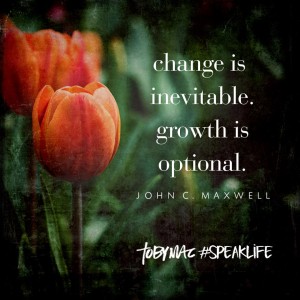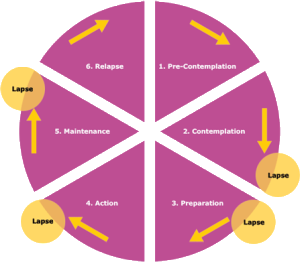For many students in high school and college, change is coming. Change is inevitable in life, no matter what season you find yourself in. Sometimes, changes are made without our choosing. Sometimes, we get to choose to change. This week, Jeff, DW and Jason are talking about the latter. In Lewis Carroll’s Alice In Wonderland, there’s this exchange between Alice and Cheshire Cat that goes something like this:
Alice: Would you tell me, please, which way I ought to go from here?
The Cat: That depends a good deal on where you want to get to
Alice: I don’t much care where.
The Cat: Then it doesn’t much matter which way you go.
Alice: so long as I get somewhere.
The Cat: Oh, you’re sure to do that, if only you walk long enough.
When you get to a fork in the road, which way you go is important. Many times, we make a choice without realizing the long-term effects of the decision. Unfortunately, sometimes our choice to just let life happen can have undesirable consequences. How do we make decisions that are both good and lasting?
Podcast: Download
Subscribe & Support the Podcast
Never miss an episode. Subscribe to the podcast for free on iTunes, Stitcher and Tune In Radio! If you like the podcast, support it.
[Tweet “If change is not systemic, it’s not change at all. -George Rotan #forkintheroad #HNRTB”]
The most common changes people make in life are relational, health, or financial. These can also be the most painful ones to make as well because they are often ones we hold close to our heart. There is one more that needs to be considered – spiritual change. The effects of making a spiritual change has great influence on the other areas of our life.
Jason is getting things ready for Summer Camp at Silver Birch Ranch. Learn more about being a camper or volunteering this summer!
Links!
Police seek arrest of mother who left disabled son in woods – CBSNews.com
60 Small Ways to Improve Your Life in the Next 100 Days – LifeHack.org
“Nobody can ever take your choice away.” @wagerdaw #forkintheroad #HNRTB
— HopeNet Radio (@hopenetradio) May 4, 2015
So, I’ve made good changes; what’s a good structure to make lasting change?
The stages of change (Stages of Change)
1. Pre-contemplation
You’re in the Precontemplation stage if: You’ve heard plenty of times (from your doctor, your spouse, your friends, or maybe your own conscience) that you should make a change — but you’re not seriously considering doing anything about it anytime soon. It may seem like too much work, or just plain not for you. When someone tries to talk to you about it (e.g., cutting back on drinking, losing weight, giving up cigarettes), you tune out, shut down or change the subject.
Moving from Precontemplation to Contemplation: It may take a scary test result or a major life event (such as the birth of a child or death of a loved one) to get you motivated to start thinking differently about your prospects for change. Meanwhile, recognize that “just thinking about it” has potential value, too, and can help open your mind to new possibilities.
2. Contemplation
You’re in the Contemplation stage if: You’re no longer opposed to making a change in your life, but you’re still sitting on the fence. Your ears may perk up when you hear someone talking about related subjects. And while you’re not actively searching for information or supportive resources, when you happen to stumble across them, you take a look. You’re gaining the confidence to imagine changing, and becoming more aware that it might very well be worth the effort.
Moving from Contemplation to Preparation: This is a great time to do the low-commitment work of envisioning your better self and your better life — perhaps journaling or making a “vision board” that represents the change you’d like to accomplish. It’s also a good time to recognize that if you have been thinking about change for a while and not doing it, there’s probably a reason: You may lack some of the necessary skills, knowledge or confidence. You may be concerned about the prospect of leaving behind familiar patterns. If so, reaching out for the support of a coach, mentor or counselor could be very helpful. Hearing the first-person accounts of others who have already made this change can be inspiring and reassuring, too.
3. Preparation
You’re in the Preparation stage if: You’re actively gathering information, support, maybe even gear and supplies — and feel nearly ready to take your first steps. You’re feeling motivated to learn the skills that will help you be successful in making this change. You’re inclined to accept appropriate support, and you welcome invitations and incentives to participate in activities that will move you forward.
Moving from Preparation to Action: This is when you sign up for that class, attend a support group, buy a health-club or yoga-studio membership, or bring home a pamphlet for services that will help you make the change you desire. If you’re determined to eat healthier, this might be when you start clearing the junk food out of your pantry and stocking up on wholesome stuff. Any initial steps — even if they are experimental — move you that much closer to Action and the sense of momentum that comes with it. Ask yourself: What, if anything, do I need to do to embrace this change in my life and be prepared for the obstacles I’m most likely to encounter?
4. Action
You’re in the Action stage if: You’re implementing your action plan. Perhaps you ate your first healthy meal, completed your first round of workouts, or got through your first few days or weeks as a nonsmoker. Congrats! Now you just have to keep going.
Moving from Action to Maintenance: Prochaska’s model specifies that after six months of consistent action, you transition into Maintenance. Getting to that point mostly involves doing whatever keeps you strong, motivated and focused. Finding ways to integrate your chosen behavior change into your social life and sense of identity can be a big help.
5. Maintenance
You’re in the Maintenance stage if: For at least the past six months, you’ve been diligent and consistent in performing the actions you committed to as part of your desired behavior to change. They now seem fairly routine.
Moving from Maintenance to Termination/Relapse: Treat obstacles and unanticipated challenges as opportunities to develop new strengths. Ward off boredom by taking on new challenges and expanding your skills. Stay on the maintenance path for two years or more, rallying even through stresses and setbacks, and you’ll reach a point where you can’t really imagine ever going back to the way things were before.
Check out the 12 Steps with Bible Verses here! Leave some comments for us below






